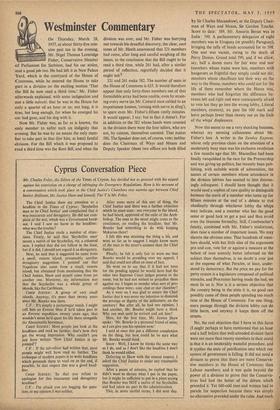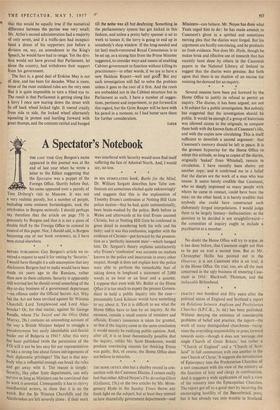Westminster Commentary
Now Mr. Fisher was, as far as is known, the only member to suffer such an indignity that evening. But he was by no means the only mem- ber to take part in that (for him, at least) fateful division. For the Bill which it was proposed to read a third time was the Rent Bill, and when the division was over, and Mr. Fisher was hurrying out towards his dreadful discovery, the clear, cool tones of Mr. Heath announced that 321 members had come, after long and careful weighing of the issues, to the conclusion that the Bill ought to be read a third time, while 261 had, after a similar period of reflection, regretfully decided that it ought not.; 321 and 261 make 582. The number of seats in the House of Commons is 625. It would therefore appear that only forty-three members out of that formidable array had been unable, even by strain- ing every nerve (as Mr. Coward once cabled to an importunate hostess, 'coming with nerve in sling'), to spare even Mr. Fisher's fifteen costly minutes. It would appear, I say; but in fact it doesn't. For in addition to the 582 whose heads were counted in the division there were the four tellers, who are not, by custom, themselves counted. That makes 586. The Speaker does not, of course, vote; neither does the Chairman of Ways and Means and Deputy Speaker (these two offices are both filled by Sir Charles Macandrew), or the Deputy Chair- man of Ways and Means, Sir Gordon Touche. Score to date: 589. Mr. Aneurin Bevan was in India : 590. A parliamentary delegation of eight members was in Uruguay (or possibly Paraguay), bringing the tally of heads accounted for to 598. One seat was vacant, owing to the death of Percy Daines. Grand total 599, and if we allow, say, half a dozen more for fair wear and tear (members whose trains were late, members with hangovers so frightful they simply could not stir, members whose chauffeurs lost their way on the way to the House, members who could not for the life of them remember where the House was, members who had forgotten the difference be- tween left and right and were consequently afraid to vote lest they go into the wrong lobby, Liberal members, etcetera), we pass the 600 mark and leave perhaps fewer than twenty out on the limb of the whips' displeasure.
Now this seems to me a very shocking business, whereat my seeming callousness about ' Mr. Fisher's loss. A writer in the Sunday Express, whose only previous claim on the attention of a moderately busy man was his exclusive revelation a few months ago that Mr. Macmillan had been finally vanquished in the race for the Premiership and was giving up politics, has recently been pub- lishing, with suitable words of admonition, the names of certain members whose attendance in the division lobbies has seemed to him distress- ingly infrequent. I should have thought that it would need a sophist of rare quality to distinguish between the merit of a member who turns up for fifteen minutes at the end of a debate to trot obediently through whichever lobby the whips may indicate, and a member who has the good sense or good luck to get a pair and thus avoid even the tiresome formality. Still, Crossbencher's fatuity, combined with Mr. Fisher's misfortune, does raise a number of important issues. We may dismiss the obvious ones. That hundreds of mem- bers should, with but little idea of the arguments pro and con, vote for or against a measure at the behest of men scarcely better informed on the subject than themselves, is no doubt a sour jest at the expense of what Pericles, at least, under- stood by democracy. But the price we pay for the party system is a legislature composed of political eunuchs, and Procrustes having made the bed, we must lie on it. Nor is it a serious objection that the country being in the state it is, no good can possibly come of these people spending too much time at the House of Commons. For one thing, mere passage through the division lobby can do little harm, and anyway it keeps them off the streets.
No, the real objection that I have to this farce (I ought perhaps to have mentioned that an hour and a half before that well-attended division there were not more than twenty members in their seats) is that it is an intolerably wasteful procedure, and it typifies the state of petrification into which our system of government is falling. It did not need a division to prove that there are more Conserva- tive members in the House of Commons than Labour members; and it was quite beyond the power of a division to prove that the Conserva- tives had had the better of the debate which preceded it. Yet 600-odd men and women had to parade for inspection because there was simply no alternative provided under the rules. And mark that this would be equally true if the numerical difference between the parties was very small; Mr. Attlee's second administration had a majority of only seven, and if a traffic-jam had incapaci- tated a dozen of his supporters just before a division on, say, an amendment to the King's Speech, he would have had to resign. Yet the divi- sion would not have proved that Parliament, let alone the country, had withdrawn their support from his government.
The fact is, a good deal of Erskine May is out of date, and has been for decades. What is more, some of the most outdated rules are the very ones that it is quite impossible to turn a blind eye to. The result is that Parliament is getting along like a lorry I once saw tearing down the street with its off back wheel locked tight. It veered crazily from side to side, the locked wheel• alternately squealing in protest and hurtling forward with great thumps, and the contents rattled and banged till the noise was all but deafening. Something in the parliamentary system has got locked in this fashion, and unless a pretty hefty spanner is set to work to loosen it, the lorry is going to end up in somebody's shop window. If the long-needed and (at last) much-rumoured Royal Commission is to be set up, as a strong hint from the Prime Minister suggested, to consider ways and means of enabling Cabinet government to function without killing its practitioners—in other words, if we are to have a new Haldane Report—well and good. But any such investigation will fail to solve the problem unless it goes to the root of it first. And the roots are embedded not in the Cabinet structure but in Parliament as such. I have a number of sugges- tions, pertinent and impertinent, to put forward in this regard, but the Grim Reaper will be here with his pencil in a moment, so I had better save them for further consideration.
TAPER











































 Previous page
Previous page